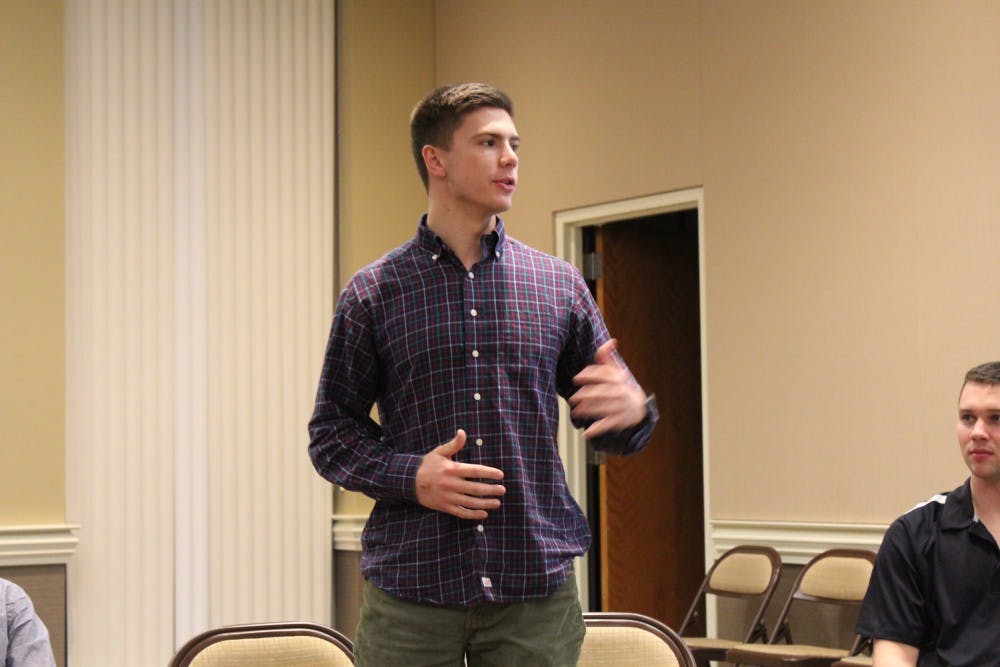Last Updated: Wednesday, March 16 at 2:40 p.m.
The majority of Elon University’s undergraduate body is female, but women on campus continue to wrestle with gender-specific issues that remain prominent in the United States.
“I always thought that the gender ratio on this campus would benefit the way women are socially received,” said sophomore Giles Roll, a member of Sigma Phi Epsilon fraternity. “But I was really shocked when I saw how much space there were between the two groups.”
The disarming but informative “Privilege Walk” activity during the “Being Male @ Elon” conversation March 9, sponsored by Diversity Emerging Education Program (DEEP) and the Center for Race, Ethnicity, & Diversity Education (CREDE), led students, faculty and staff to analyze gender divides on a female-dominated campus. Sigma Phi Epsilon partnered with DEEP and CREDE.
Attendees began by standing shoulder-to-shoulder and then stepped forward or backward depending on their responses to specific questions.
Questions included if they felt in danger walking home alone from parties, if they’ve ever been sexually harassed, if they felt their clothes classified their sexual orientation or if they felt raising children while working simultaneously would be perceived as selfish by society.
By the end of the exercise, a clear distinction was made between the male and female participants, with all the females having taken many steps backward and most males having taken many steps forward. This represented how being a male might hold its share of advantages.
Led by freshman Micalah Collins and sophomores Arielle Watkins and Coty Consic, members of various communities joined together in Moseley’s McKinnon Hall to share their perspectives and experiences on gender inequality.
“I’m so excited to be with different groups that do not commonly work together,” Watkins said. “It’s important to get a variety of people with different knowledge and experiences and to talk with people that I wouldn’t normally approach on campus.”
The event was one of several offered by DEEP intended to promote conversation and openness about privilege on campus. In this discussion, gender privilege was the subject.
“Oftentimes, one of the most defining pieces of having privilege is not thinking about or acknowledging that privilege,” said senior Sigma Phi Epsilon member David Perell.
Much of the conversation was dedicated to analyzing scenarios in which gender can dictate treatment and set labels.
The two prominent scenarios were athletics and sex lives.
Watkins complained that Elon women’s basketball games are sparsely attended and the team is under-recognized on campus despite their successes this season compared to the men’s team.
“They barely get any fans, and the school oftentimes hands out free items to lure in fans,” Watkins said. “Why are these girls, who work so hard, undervalued?”
Sophomore Jason Lind offered thoughts about gender inequality by discussing the perception of promiscuity in men versus women.
“If you’re a girl and have many partners, you’re a slut,” Lind said. “But you’re revered as a guy.When one group does something and is praised while the other is punished, that’s privilege.”
While much of the conversation touched on the benefits of being a male Elon student, a significant portion was dedicated to some of the hardships male students face.
Many offered thoughts on the pressures to conform to the “typical Elon male” — one that is athletic, handsome and, above all, well-dressed.
“This is an alpha male culture,” Perell said. “People struggle with their masculinity and where they fit in. It is a huge deal to dress well, and in ways, I’ve submitted to that culture. It’s something I think we don’t even realize we’re doing.”
Members of the discussion were quick to support Perell. Lind said that there is a time in development of everyone’s life where that becomes an arbitrary concern.
“It is hard, but I think part of growing up is not really caring about what other people think when they see you and how you appear,” Lind said. “People everywhere are naturally going to be judgmental whether you are dressed preppy or not.”
Students also discussed issues of chivalry and the assumptions women have when they are courteous.
“A lot of times, I feel like if I open a door for a girl, or pull a seat out for her, either she, or her friends or people around us, will think I’m only doing it to get into her pants,” Roll said. “Especially because people carry preconceived ideas about guys in fraternities.”
Collins said she agreed with Roll’s observation.
“Because of the media and the portrayal of fraternities and sororities, some people have already made up their mind about frat guys,” Collins said.


